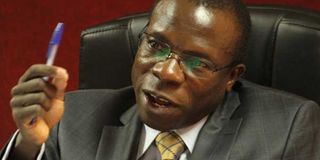Relax, judges told over sub judice rule

Justice George Odunga. FILE PHOTO | EVANS HABIL |
What you need to know:
- The sub judice rule today sticks out like a sore thumb.
- It is contrary to Article 33 of the Constitution.
It was the most controversial application of the sub judice rule.
In February 2012, the High Court banned public discussion on whether Mr Uhuru Kenyatta and Mr William Ruto should contest the presidency.
Civil society groups had gone to court to challenge their eligibility following indictment by the ICC. So the court ruled the case was sub judice.
Sub judice means “under judicial consideration” and, therefore, prohibited from public discussion.
The sub judice rule is part of the law relating to contempt of court. Contempt of court is punished by imprisonment, fine, and whatever other sanctions the court may deem fit.
Kenya does not have an original law on contempt of court. The Judicature Act, which provides for contempt of court, states that the High Court and Court of Appeal have the same power to punish contempt of court as that possessed by the High Court of Justice in England.
STICKS OUT
The sub judice rule today sticks out like a sore thumb. It is contrary to Article 33 of the Constitution, which guarantees the right to freedom of expression. That right can be limited only if it is reasonable and justifiable in an open and democratic society.
The main purpose for the sub judice rule is to protect judges from being influenced by public talk on cases before them. But it is often argued that Kenyan judges are professionally trained and can easily withstand undue influence.
“In our courts, the issues of fact in a trial are determined by professionally trained judges and magistrates. We would expect these professionals to be quite capable of ignoring media comments and agitations,” said Senior Counsel Paul Muite.
He was addressing a judges’ colloquium last Friday. Describing the sub judice rule as “a judicial wasteland”, he urged the 123 judges gathered in Nairobi to apply it “narrowly, not expansively”.
He told the judges to let up on the sub judice rule. “We have been wrong in the way we have applied the sub judice rule in the past. Past interpretations were hostile to freedom of expression and of the Press and inconsistent with the ethos of a republic constitution,” he said.
AMERICAN SYSTEM
He urged the judges to follow the jurisprudence of the US Supreme Court and Indian Supreme Court, which, he said, is better than that of the British. “After all, we modelled our 2010 Constitution on the American presidential system not on the British parliamentary system, which Kenya had inherited at independence but rejected at the referendum,” he said.
His pleas may not have fallen on deaf ears. At least one of the judges — Mr Justice George Odunga — is on record as saying the law relating to contempt of court is due for updating.
In John Mugo Gachuki v New Nyamakima Co Ltd, he said it was unfortunate and regrettable that 50 years after independence we were still looking to the High Court in England for guidance on how to punish contempt of court.





